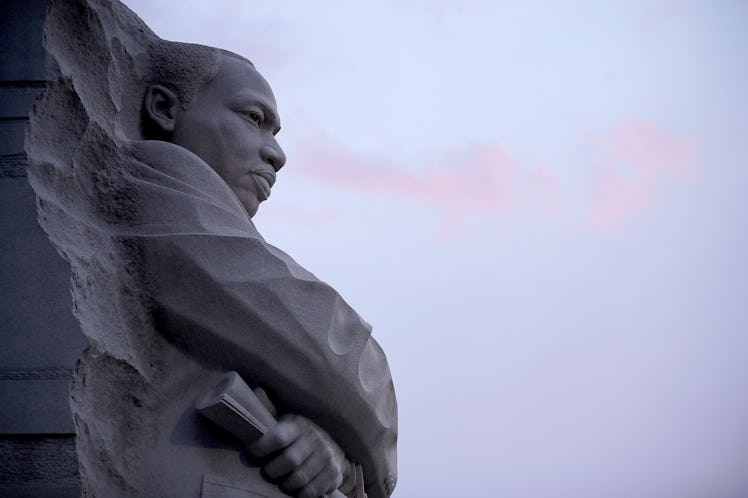
No, MLK Didn't "Lose" His Life, & There's A Good Case For Why You Should Stop Saying It
Wednesday, April 4, marks 50 years since the assassination of Dr. Martin Luther King, Jr., and that half-century mark has inspired lots of coverage revolving around a remembrance of the civil rights icon's legacy. But alongside his life's work, there's another simple fact worth remembering: Martin Luther King didn't simply "lose" his life in 1968.
King was killed.
What's more, his murder came a day after explaining to an audience that he had come to peace with the idea of early death, all but deeming it an inevitability because of the amount of vehement opposition his mission had attracted in America.
Constantly confronting that indisputable fact serves a purpose, but it's understandable how that purpose could be avoided for benevolent reasons.
People as likely to say King "lost his life" as they are to say that about a loved one. The term "lost his life" is, after all, a euphemism used to avoid the more accurate and painful reality: that a person has died. With King, though, there's an especially good case for why that painful reality is worth facing, over and over again. It's because there's already a tendency to remember the civil rights leader in ways that whitewash his legacy and paint an inaccurate — or, at best, incomplete — portrayal of how he went about his work and how his work was received.
That tendency is the reason why a certain theme repeats itself year after year, usually around the Martin Luther King holiday and the day on which he was assassinated.
Pay attention, and you'll notice it.
In January 2016, Rutgers University history professor Donna Murch outlined five myths about Martin Luther King in the pages of The Washington Post. In January 2017, University of New Hampshire professor Jason Sokol asked "Which Martin Luther King are we celebrating today?" in the opinion pages of The New York Times. In the years to come, we're likely to see more articles like them, with learned professors explaining what the general public gets wrong about Martin Luther King.
Their reminders are warranted, too.
For as much as there's a tendency to say King "lost his life," there's a tendency to portray him as a universally loved figure, rather than the man who was met with stones once he dared to march in suburbs beyond the South.
It's also common for Martin Luther King to be remembered as someone who organized protests "the right way," while contrasting him to the "troublesome protesters" of the modern day. Never mind that "the right way" still prompted the federal government, through the FBI, to surveil King's every move and work to dismantle the movements he led.
And then there's the tendency to remember King as one who fought only against the most radical and overt racists, rather than the man who wrote in his letter from a Birmingham jail, "I have almost reached the regrettable conclusion that the Negro’s great stumbling block in his stride toward freedom is not the White Citizens’ Counciler or the Ku Klux Klanner, but the white moderate, who is more devoted to 'order' than to justice."
The way in which his murder is talked about, and these aforementioned tendencies, all play into a greater trend. Too often, only the most comfortable version of Martin Luther King is remembered, despite the fact that he lived his life trying to make America uncomfortable with how powerful of a force racism was — and is.
That is fact as indisputable as another: Martin Luther King Jr. didn't lose his life. He was killed and despised because of the way he lived it.